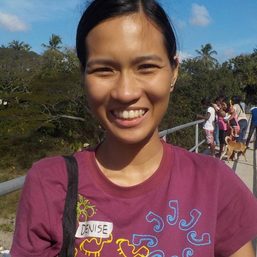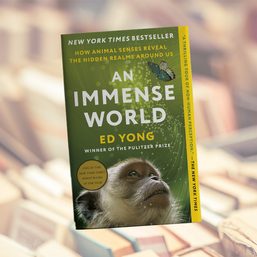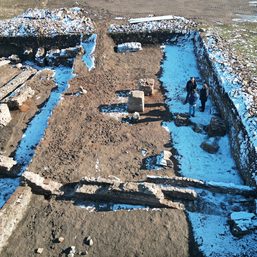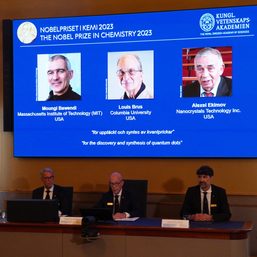SUMMARY
This is AI generated summarization, which may have errors. For context, always refer to the full article.
![[OPINION] How science can rise over populism](https://www.rappler.com/tachyon/2020/10/science-over-populism-october-26-2020.jpg)
The populist administration of President Rodrigo Duterte has been characterized with controversies and attacks on almost anyone with a different opinion. Yet what is becoming clear is that change definitely has not come for integrating science into decision-making critical to national development.
From the “white sand” project on the shores of Manila Bay to the poor response to the COVID-19 pandemic relative to almost the rest of the world, data-driven, science-based policymaking has seemingly been sacrificed in favor of approval ratings and political gains.
Make no mistake: the lack of importance given to science in the Philippines predates the current administration. The science and technology sector often receives one of the lowest yearly budget allocations. Separate international assessments reveal that the country not only has one of the biggest shortages of scientists in the Asia-Pacific, but also one of the lowest literacies in mathematics and science among students.
But never has science been under such blatant attacks than the present, in an era of distortions of our reality. At a time when science-based decision-making is desperately needed to address the increasingly complex challenges of today, it is becoming more disconnected from the modalities for meaningful change.
Oil-and-water case
No one can dispute the role of science and technology in driving local and national development. The world’s most sustainable economies and governments are those with a strong foundation in science, technology, engineering, and mathematics (STEM), able to effectively respond to both immediate and long-term challenges facing their respective citizenries.
In many ways, science is the antithesis of what makes populism thrive. In its purest form, science is about confronting our reality, a discipline of knowledge-building through making systematic observations and tests. It provides an objective lens through which to view our world that cannot be distorted by persuasions and emotions.
And here lies a fundamental challenge: humans tend to avoid facing uncomfortable realities that science often reveals. For Filipinos that are suffering from poverty, inequalities, and other long-running socioeconomic issues, they are more likely to be drawn to rhetoric that gives them a sense of security and hope for a better future.
Such is a reality that populist leaders take advantage of. They appeal to the fears of the public and claim to know best when it comes to problems and corresponding solutions. They speak with such confidence that people may disregard the authenticity of what they are saying. All that matters is that someone is finally listening to their concerns and ready to take on oppressive systems that are actually perpetuated by the same populist leaders.
In contrast, communicating science is usually done with caution and uncertainty. While political developments are frequently covered by mainstream media, scientific developments are more isolated, both in practice and in reporting. Unfortunately, many scientists in the Philippines and elsewhere lack the interest and capacity to communicate information to other sectors in a laymanized manner.
These conditions also create the perception of science as a representation of elitist interests, being largely inaccessible to the general public and prone to the polarizing tactics of populism. This is also evident in the toxic Filipino culture of “smart-shaming;” a culture of mistrust is imposed on those with high education, including scientists, as they seemingly represent the contrast to the deeply-ingrained sense of conformity and togetherness.
What results from these factors is an incoherent, divisive environment that forces Filipino scientists to seek more productive working environments overseas and discourages those already abroad from engaging in the Balik-Scientist program. This also dissuades some of the youth from pursuing a career in the sciences, which would hinder the long-term national development of a country in need of at least 19,000 more scientists and researchers to be truly competitive.
Fighting fire with water
In this era of information overload, delivering the message becomes as valuable as the message itself. Influencing policymaking related to any issue begins with understanding the concerns and hopes of relevant stakeholders.
Practitioners and communicators alike must utilize more non-traditional means of communicating science to governments, businesses, the media, and communities. Presenting findings and proposing solutions through photographs depicting daily lives of affected individuals and communities, social media tools, podcasts, and music, among others can help bridge the gap between scientists and their target audiences.
Science is ultimately meaningless unless it is done in service of improving the lives of others in a sustainable way. As a response to these challenging times, this can no longer just be limited to publishing journal articles and speaking in conferences to fellow scientists.
This is the time for Filipino scientists to become more vocal not just in issues where the credibility of their fields is being attacked, but in other issues of national and/or local significance as well. Creating a reputation for experts relatable to the general public and maintaining a strong presence in communication platforms can counteract the destructive influence of purveyors of misinformation.
A more active scientific community can ultimately influence a shift in Philippine governance from personality-based to issues-based decision-making. Voting more wisely in future elections can only improve how science is regarded in our country, from strengthening STEM education across all levels, to higher budgets for research and development, to enhanced science-based policymaking.
The truth will set us free from the current normal that has defined our country for decades. But only if we stop falling for illusions and parlor tricks. Always remember, a magician’s best friend is a drunk audience. – Rappler.com
John Leo Algo is the Program Manager of Living Laudato Si’ Philippines and Climate Action for Sustainability Initiative. He earned his MS Atmospheric Science degree from the Ateneo de Manila University in 2018.
Add a comment
How does this make you feel?



![[WATCH] Bamban POGO scandal: There’s a bigger fish than Alice Guo](https://www.rappler.com/tachyon/2024/07/inside-track-tcard-bamban-pogo.jpg?resize=257%2C257&crop=435px%2C0px%2C1080px%2C1080px)
![[Vantage Point] China’s silent invasion of the Philippines](https://www.rappler.com/tachyon/2024/07/TL-china-silent-invasion-july-16-2024.jpg?resize=257%2C257&crop=318px%2C0px%2C720px%2C720px)



![[OPINION] Remembering RSP, Norman and Jessie – geoscientists for the people](https://www.rappler.com/tachyon/2024/04/raymundo-punongbayan-April-29-2024.jpg?resize=257%2C257&crop_strategy=attention)

![[OPINION] Duterte’s populist rants: Will they work this time?](https://www.rappler.com/tachyon/2024/02/20240205-TL-duterte-dusts-off-populist-rants.jpg?resize=257%2C257&crop_strategy=attention)


![[Time Trowel] There is more to archaeology than Indiana Jones’ pistol and whip](https://www.rappler.com/tachyon/2023/12/tl-timetrowel.jpg?resize=257%2C257&crop=245px%2C0px%2C720px%2C720px)

There are no comments yet. Add your comment to start the conversation.